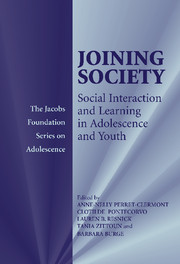Book contents
- Frontmatter
- Contents
- List of Contributors
- Foreword
- Preface
- I Introduction
- II Youth-Constructed Socialization
- 4 Risks, Rules, and Roles: Youth Perspectives on the Work of Learning for Community Development
- 5 Youth Between Integration and Disaffiliation in French Cities
- 6 A New Identity, A New Lifestyle
- 7 Becoming a Member by Following the Rules
- III Personal Agency Through Collective Activity
- IV Learning in Practice and Discourse
- V Intergenerational Sites for Thinking
- VI Pathways to Adulthood in National Context
- Index
- References
4 - Risks, Rules, and Roles: Youth Perspectives on the Work of Learning for Community Development
Published online by Cambridge University Press: 08 January 2010
- Frontmatter
- Contents
- List of Contributors
- Foreword
- Preface
- I Introduction
- II Youth-Constructed Socialization
- 4 Risks, Rules, and Roles: Youth Perspectives on the Work of Learning for Community Development
- 5 Youth Between Integration and Disaffiliation in French Cities
- 6 A New Identity, A New Lifestyle
- 7 Becoming a Member by Following the Rules
- III Personal Agency Through Collective Activity
- IV Learning in Practice and Discourse
- V Intergenerational Sites for Thinking
- VI Pathways to Adulthood in National Context
- Index
- References
Summary
To give up obedience to the powerless is most difficult….
AdornoInstitutional Voids
When institutions of society become unable to handle key changes in the rhythms and patterns of human behavior, new institutions need to emerge. Throughout human history, however, despite wars and major political changes, the emergence of our familiar institutions (e.g., family, religion, government, organized economies, and formal education) came slowly, silently, and in coordination with numerous shifts in key arrangements of daily patterns of existence and interaction among individuals.
Patterns of employment as well as leisure have drastically shifted family life and community cultures, and the need for new institutional arrangements to care for the young appears increasingly evident to certain decision makers. Acknowledged is the need to provide extended care for children from families with two working parents or a single parent who works outside the home in at least one job, often with extended hours (and in the United States, without health benefits). In addition, the fallout effect of pulling the best and the brightest out of failing impoverished communities is becoming ever evident. Since World War II, the United States, in particular, has stressed access to higher education for all.
Consequently, as educational levels have risen, so has out-migration of the young from burdened rural and impoverished communities to either urban or suburban environments where jobs and promises of a comfortable middle-class life have beckoned. But as these middle-class parents have gone off to their jobs, their children have remained alone during out-of-school hours.
- Type
- Chapter
- Information
- Joining SocietySocial Interaction and Learning in Adolescence and Youth, pp. 41 - 70Publisher: Cambridge University PressPrint publication year: 2003
References
- 1
- Cited by



